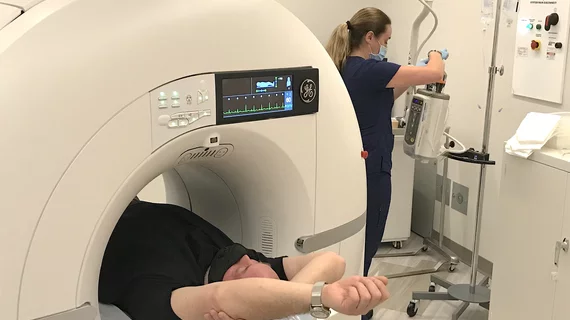ACR updates requirements for on-site staff overseeing contrast administration
A medical professional trained to manage contrast reactions should be on-site at any imaging facilities conducting contrast studies to maintain patient safety, according to an updated statement from the American College of Radiology (ACR) Committee on Drugs and Contrast Media this week.
The ACR stated that the revised statement aims to provide flexibility to imaging facilities. If a physician provides direct supervision for the study either on-site or remotely, the ACR makes it clear that a medical professional trained to manage contrast reactions should be present on-site. Remote supervision should be available whenever contrast material is administered and should include standard post-administration monitoring.
Providers with the capabilities specified in the contrast statement listed below can provide the service on-site, as long as those qualifications and processes are consistent with state and local laws and rules related to telemedicine, as well as the processes and policies of the service site.
The Drugs and Contrast Media Committee on Supervision of Contrast Material Administration states on its site that there must be a radiologist or other physician present, which can include radiology residents or fellows, or a qualified individual who is acting under the general supervision of a physician. This individual must meet the following criteria:
1. Have received training and meet institutional periodic competency guidelines for evaluating patients and diagnosing and differentiating between different types of adverse reactions to contrast material.
2. Be able to recognize when medical intervention is required for a hypersensitivity immediate reaction or physiological adverse event due to contrast administration.
3. Be trained and legally permitted to administer prescription medications (e.g., antihistamines, intravenous fluids, beta-agonist inhalers, epinephrine) and other appropriate interventions independently or under a standing orders/algorithmic approach as per state law or regulations, and in accordance with local, institutional, site, and facility policies, guidelines, and rules. These interventions are those indicated for urgent response to a contrast material adverse event as listed in the ACR Manual of Contrast Media or similar local policies or guidelines.
4. When qualified to act under general supervision of a physician, be able to consult with the supervising physician within an appropriate timeframe.
5. Has minimum basic life saving (BLS) certification.
6. Understand when to call for assistance and how to activate emergency response systems. ACR said staff also need to consider the timeliness of available emergency response systems if a patient has a reaction.

